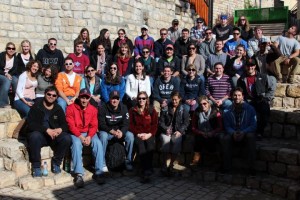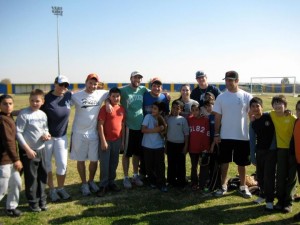Rhett Wiseman: Top prospect is a team player
By Zev Ben Avigdor, Correspondent
The son of a choreographer and a crime-scene cleanup specialist, 21-year-old centerfielder Rhett Wiseman grew up in Mansfield, Mass. Drafted out of high school by the Chicago Cubs, he postponed pro ball for the chance to attend Vanderbilt University, where he helped deliver a College World Series championship.
Wiseman may be best known among some Commodores fans as the player who got drilled in the neck—hard—when he squared to bunt in the first inning of a 2015 college playoff game but went on to single and homer in his next at-bats [see article). A huge fan of Vandy coach Tom Corbin and the team culture he has built there, Wiseman hit .415 with 15 home runs in 2015 and was equally accomplished off the field, twice making the SEC’s Academic Honor Roll.
The Washington Nationals drafted Wiseman in the 3rd round of the 2015 draft and assigned him to the short season Auburn Doubledays, where he performed well enough to be ranked the Nats’ 23rd-best preseason 2016 prospect by MLB.com. I spoke at length with Wiseman before a Doubledays home game on Sept. 3, 2015. In the edited transcript that follows, you’ll see why Coach Corbin called him a “very positive kid who enjoys the team element.”
JBN: Where are you from?
Wiseman: I grew up in Massachusetts, right by the Cape. Spent all my summers on the Cape, down at Falmouth. There’s nothing like it.
JBN: And you played in the Cape Cod League?
Wiseman: Played in the Cape Cod League for two seasons, yeah, under Coach Mike Roberts with the Cotuit Kettleers—two of the best summers of my life for sure. It’s kind of surreal. My father actually played for Cotuit in the 80’s. [Editor’s note: see related article.] I think ‘88. That was cool—that was the first thing. But just going down there and obviously living so close, being able to play in front of my family every night and friends who didn’t get to see me play a lot, and then just the prestige of the Cape Cod League and everything that it brings to the table as far as that goes.
The first couple of weeks I’m [at Vanderbilt] a kid comes up to me and says “Man, I’ve never met a Jewish kid before,” and it’s like “Wow!” You know what I mean? Holy cow, where am I? I was like, “Well, what do you think?”
JBN: Who’s Jewish, your dad or your mom?
Wiseman: My father.
JBN: So he was a Jewish baseball player back in the day?
Wiseman: Oh, yeah.
JBN: Is he the one who got you started?
Wiseman: Oh, yeah. Absolutely. And he was good too, obviously, playing in the Cape League.
JBN: Where did he play college ball?
Wiseman: He went to Brandeis.
JBN: Very Jewish.
Wiseman: Very Jewish. Back when Brandeis was good. That’s what he tells me, anyway. He was an outfielder. [Editor’s note: Mike Wiseman is ranked second all-time at Brandeis with a .915 stolen base percentage, third all-time in total stolen bases (54) and hits (194), and sixth all-time in total bases (267).] So he’s been there for me, obviously, throughout all of baseball, but he’s definitely been my number one as far as going to the field. I mean, there was a time where I was playing little league that we would break the locks to get into the little league fields early. He would come home from work, we’d take a lock cutter and—
JBN: No!
Wiseman: Oh, yeah. He would leave work every day early, come pick me up three or four hours before the game and hit, so they ended up putting a lock on the gate so we couldn’t do it because it wasn’t fair to everyone else. So we would go down there every day with a pair of bolt cutters, break the locks, and go in there and hit for a couple of hours. He’s got a lot of throws in that arm. We didn’t have an L-screen because I was in little league and not a lot of people needed them. So what he would do is, he would take three trash barrels, stack two up on one side, and put one up on the other side and throw behind that. A lot of close calls, but very fortunate.
JBN: What does he do?
Wiseman: He owns a company that cleans up crime scenes. Crazy work, and he can sit down with anybody and talk to them for days—some of the stories that he has.
JBN: You ever go with him?
Wiseman: Oh, yeah. As a kid I would go with him all the time. I’m very fortunate for those experiences. Obviously I get to see a part of life and obviously the end of life that people never see. It’s so interesting always listening to him and how he goes about death as a part of life. To him it’s a lot different. It’s something that happens. He’s been in that business for so long that he cherishes every single day so much more than most people do, you know?
JBN: So your dad was an outfielder and you’re an outfielder.
Wiseman: Yep.
JBN: Your dad cleans up crime scenes, you studied criminal justice.
Wiseman: Yeah. You finding a trend there? We’re super close. He’s one of my best friends.
I would love to play for Israel in the World Baseball Classic too. Oh my goodness. I would love that. That would be a dream.
JBN: Has he been to Auburn (NY) to see you play for the Doubledays?
Wiseman: Oh, yeah. All the time, because it’s not bad. It’s a 45-minute plane ride, and if they drive it’s like four-and-a-half hours. So it’s not that bad. They will actually be here tomorrow. I think my sister is coming. She is still in school. She goes to Wheeler Academy, in Rhode Island—Providence. She’s a senior this year.
JBN: Does she play baseball?
Wiseman: No, she doesn’t. She’s a dancer. She’s applying for schools and that whole deal right now.
JBN: Did she ever get you to try to take up dancing?
Wiseman: My mom? No.
JBN: Your mom was a dancer, too?
Wiseman: Yeah. [Editor’s note: Stephanie Wiseman owns a dance studio and is a professional choreographer.] My sister would love to go to college where she can excel in that. She’s looked a lot at NYU. She went to Michigan last week. She’s looking for big art schools to get into.
JBN: Cold.
Wiseman: Cold, yeah. I went down south, she’s going to end up going north. It’s just not my thing.
JBN: You said once that one of your favorite people is the equipment manager for Vanderbilt.
Wiseman: Yes. Absolutely. [Garrett Walker] is unlike anyone I’ve ever met in my life. This is a guy who spends his life serving other people. That’s what he does. He’s a full-time staff member. I believe this is his fourth year in the program. He is a guy who — you hear about people who walk into a room and light it up? This is the guy. This is a guy who, no matter what is happening in his personal life, comes to work every single day looking to make other people smile. And obviously you don’t [often] come across people like that. He’s such an incredible guy. He’s just all about making other people smile and being there for other people. I could talk about him for hours. He’s a very inspirational person. It’s funny that you find inspiration in people and places you never expect, you know?
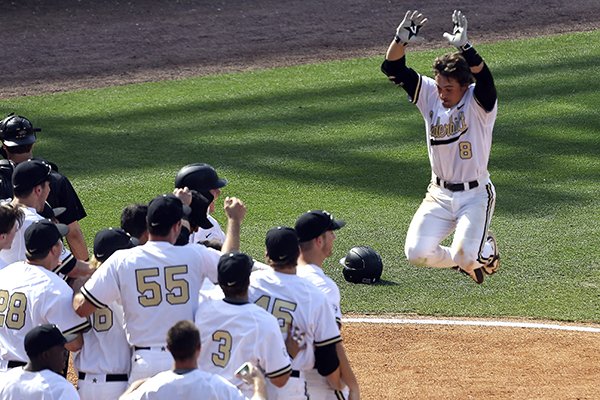
Rhett Wiseman celebrates after hitting a walk-off home run for Vanderbilt in 2015
JBN: I also read that your college coach not only embraced but celebrated diversity.
Wiseman: Oh my goodness. You look at what we just said about the equipment manager. It’s Coach [Tim] Corbin at Vanderbilt who brings in people like this. What Coach Corbin has done at Vanderbilt— you obviously look at the success that we have had over the past couple of years, but I mean you get to a point where talent kind of evens itself out—it levels itself out. The factors that separate people are the type of people they are and what they are like inside of a culture, and Coach Corbin has really created a culture at that school that embraces all types of people. And you can go down that roster and, like you said, cultural diversity, but it’s so much more than that. Everyone is different.
JBN: In what ways?
Wiseman: In different ways. I mean, for example, we have two student managers at Vanderbilt. You may have heard of one of them—[Josh Ruchotzke is a] quadruple amputee. He’s incredible. He’s amazing. This kid’s out there shagging balls every single day with a glove on that was custom made by Wilson for one of his hands. He’s got prosthetic limbs, and he’s out there catching balls. Throwing balls. Feeding machines. He’s out there hitting balls. It’s amazing. [See article.]
We have another student manager who I’m actually living with when I go back to Nashville, Michael Portu, who has had multiple open-heart surgeries. He gets back there and he catches every single day. And he’s catching both hands. I mean, he’s taking hundred-mile-an-hour fast balls—boom, boom, boom, boom. This is also a kid who runs the conditioning with us in the fall. Now, keep in mind that conditioning in the fall— we have a lot of freshmen on the team with egos, and part of the point of fall conditioning is to break you down and bring you together as a team, get rid of those egos that you have from high school. And this kid gets on the line with every single whistle and runs it with us just to be a part of that team. [See article.]
And they are part of the team. There are no titles. There are no ages. There’s nothing like that. Everyone is so different but everyone is our brother and that’s just the way it is.
JBN: It’s not just the conditioning drills together, right?
Wiseman: It’s Corbin. It’s Coach Corbin. It’s the culture. He’s incredible, and we’re all his sons when we go there. He’s a father figure to everybody that goes there, and his biggest thing is we are together. He’s established a set of standards. There are no rules, there’s no such thing as rules, there are only standards. The standards are standards that he believes that you should live by and absolutely you should live by. It’s things as simple as keep your locker pristine to things on a larger life scale such as respecting women. It’s things that keep you focused but keep you well rounded, too. I mean, you look at Corbs, and when we’re all there we’re together from the second we wake up until the second we go to sleep. We aren’t allowed to live off campus, we have to live with each other. I say we “have” to—they’re my best friends in the world. Everything we do is together. We eat together. We go to the field together. We go to class together. We do everything together. And what that does is it makes everyone so close, and there are no secrets really. We have sessions where we just talk about our lives with each other and it’s unlike any other program. Because Coach Corbin always says that if we focus on the things that are important, the scoreboard will take care of itself. [Winning] is the last thing that we are concerned with. If we focus on our chemistry and getting better and working on our training every day and on our practice every day, then the scoreboard will take care of itself. It’s so much more than winning. Communication’s huge.
JBN: And you have people who speak different languages on the team.
Wiseman: Oh yeah. For the most part obviously you have to be pretty fluent in English to get into Vanderbilt. The beautiful part of that is that it’s Vanderbilt. It’s a two-way street there and we have guys who are very good at other languages, too. I think that’s helped me tremendously being here [in Auburn]. I mean, I speak Spanish more than I do English here. I’m not proficient. I’m okay, but by the standards that I learned it there, I’m pretty good here. But for the most part, going back to bridging gaps, it’s such an open environment. It’s open to failure, it’s open to being emotionally charged and having emotional outbursts. It’s really open to confrontation. It’s open to everything.
JBN: How do you handle that? Most Americans don’t handle confrontation well. They take it personally.
Wiseman: Well that’s the biggest thing. Coach Corbin talked about how confrontation isn’t a personal attack, it’s really a criticism. If someone is going to confront you, especially on a baseball field, it’s because they want to invest in your future. They want you to be better. You know if you are doing something wrong, and someone gets onto you about it, it’s because they want you to be better. We’re only as strong as our weakest link there, so we really embrace confrontation, and obviously confrontation doesn’t happen every day because then it would just be all over the place. It’s not a well-oiled machine if there’s confrontation every day.
JBN: But if there’s the right kind?
Wiseman: Exactly. And there is. Everybody holds each other to the highest standard possible. And that’s so refreshing, because we don’t have to worry about a Friday night or a Saturday night, because we know that there are guys who are going to be protecting our culture and not going to do something stupid that will jeopardize everything that we’ve worked for.
JBN: What are some more of the standards that you mentioned?
Wiseman: I would say that the biggest standard is—and really this standard covers all the other ones, because I could write you a list of standards for days—the biggest thing that we try to live by is don’t embarrass yourself. If you don’t embarrass yourself, then you’re fine. And you just have to know [that] the biggest thing in that is that every action that we do has a consequence. And every action that we do affects not just the 34 other people on the team but all the coaches, everyone—the equipment managers, our baseball operations people. Coach Corbin talks about it as a drop in water. You take a drop of water and you drop it in, and it hits the water and you have that initial kind of burst right there. And then you get all these patterns coming off that. Now if that initial action is that drop of water that hits, you see it causes a ripple effect. The ripples affect everything else.
JBN: What role did religion play when you were at Vanderbilt?
Wiseman: It’s really different. And this is one of my favorite things to talk about, because, obviously [being] from Boston, [where] it’s pretty much as diverse as it’s gonna get, from a cultural, ethnic, religious standpoint. The high school that I went to, Buckingham, Browne and Nichols—we had a very large Jewish population, we had an Islamic population, we had a Catholic population. We had everything you could imagine there. And then all of the sudden I go to Tennessee, which is— a little bit different. So, you go from a place where everyone knows Jewish people, Islamic people—everything. And you go down South and it’s Christianity, and it’s Baptist. The first couple of weeks I’m there a kid comes up to me and says “Man, I’ve never met a Jewish kid before,” and it’s like “wow!” You know what I mean? Holy cow, where am I? I was like, “Well, what do you think?” (laughs). But religion down there, it’s just like anything else. There aren’t as many Jewish people, obviously, but at Vanderbilt I know there is a decently large Jewish population.
JBN: And on the team there were Jewish kids?
Wiseman: There were, yes. There were a couple while I was there. But the biggest thing I would say culturally is seeing guys from all different walks of life, and you can include religion in that, but more so economic situations, guys coming from— I look at Ro Coleman who is one of my favorite people I’ve ever met in my life. Are you familiar with Ro Coleman? Inner city, Chicago, South Side.
JBN: And there was a player from Sandusky, Ohio…
Wiseman: Sandusky, Xavier Turner, yep. Those two guys who come from totally different situations than a lot of other people would. The beautiful thing is these guys come from these places and they come to this thing that is totally different to them. But in reality, no matter where you come from, there’s nothing like this. So it’s everyone that comes in here, whether you come from royalty, whether you come from nothing. Whether you come from east, west, it doesn’t matter. When you come here it’s a wash. Everything. You have a blank sheet. You have not done anything. You start from scratch. Which is beautiful. It’s a great thing really. There are no prejudices. It’s such an open forum, everything is so pure, it’s about the only way I can describe it. It’s real. It all goes back to Coach Corbin. It’s the environment that he creates. It’s so welcoming. It’s never that you’re uncomfortable. You’re just you. It’s a situation that he creates that allows you to be comfortable in your own skin and keep your innocence in being yourself.
JBN: Tell me more about that environment—that’s fascinating.
Wiseman: It is, it really is. If you listen to him talk, it’s incredible. What he does is—and he’s only been there thirteen seasons—he’s created this culture when first of all there wasn’t a culture there. There was not any culture. There was a team that finished below five hundred every year, and he came there, and the first thing he did was he recruited guys who would buy in to what he was selling, which is obviously the most important part. Because if you have guys that aren’t buying in, you have nothing. So he recruited the right guys and he had some talented guys in there who had the talent but had it more importantly between the ears. And it’s the only school really in the country where the pros go back there and work out in the off-season, myself included. I will be going down there as soon as I’m done with instructs, and I will live down there all off-season, and I will be down there with 35 other guys who are playing pro ball who live down there too because they want to be around it. It creates this atmosphere where you are always a part of that team, and you’re always there, and you get these freshman guys and all of a sudden they are sitting next to major league All Stars. And they’re saying, “Wow, this place really is special” and “Wow, we will get back to this.” This is what is being created now, and it’s a snowball effect. Everyone who’s in it thrives.
JBN: Think about what those major leaguers are getting out of it by coming back into that environment.
Wiseman: Oh yeah, absolutely. It’s great for them as well obviously.
JBN: What do you think it’s going to be like for you, going back there as a pro?
Wiseman: You know, it’s definitely going to be different. I definitely miss being there every day. I miss it now. And no one understands that. The only people who understand that are people that were in that culture. But instead of being a direct family member, now I’ll be a cousin, which is how we talk about it. When everyone is there, we’re brothers. It’s a family. You have your cousins that come back and that’s what I’ll be now, but everyone gets something so special out of it and it really is another family for everybody. I always talk to the guys out here [in Auburn], when we’re just messing around, kind of BS-ing, and [I asked], “Hey, you gonna go back to your school?”, and it’s like “Pffft..no way!” It’s like, “Why would I want to go back there? I was miserable. I hated the coach, I hated the way it was run,” and I was like, “Wow!” It’s amazing. I can’t even fathom and I can’t imagine being in a place for three or four years of my life where I was miserable all the time. And everyone has fun, and honestly, the best thing I got out of it—and there are so many things. I could write a seven-hundred page book of the things I got out of that place but the number one thing is the joy that the guys got out of seeing other people succeed, and that was something that doesn’t happen overnight.
JBN: And yet you’re actually in competition with one another, right?
Wiseman: Oh, yeah. You could be a three-year starter there, be an All-American, and you could come back and be beaten by a freshman. That’s just the way it is. And like I said earlier, there’s no grade, there’s no age, there’s no anything. All that’s completely out the window.
JBN: So why isn’t that kid bitter? Why isn’t that senior not resenting you as a freshman, why is he supporting you and even helping you get better?
Wiseman: That’s the miracle of Coach Corbin. It’s what he creates. It’s the brotherhood that we buy into and that we feel for each other, and the strongest emotions I’ve had there over the past three years were definitely seeing guys go in and succeed in huge moments and watching the whole team come around those guys. I could list a bunch of different examples, but for one you got the 2014 College World Series where we won the whole thing. Xavier Turner is our starting third baseman for over a hundred straight games—he had played almost every game his freshman year, almost every game his sophomore year—and then—bang!—the College World Series comes, and he gets deemed ineligible by the NCAA. He’s done. He can’t play. Starting third baseman. All-American. Hitting .300. Gold Glove. Stud. Done. Just done. Done, out. College World Series. So we have other guys, obviously, that we can go to, and Coach Corbin sits down with our team leaders and kind of discusses everything. And they make a decision on who they want to go in, and it’s this sophomore Tyler Campbell who has had 21 at-bats before that, who has also been my roommate for two years, who is one of the greatest kids I’ve ever met in my whole life, who goes out every single day, and you would think he was trying out for the team every day, with the way he goes about his business. And through the way that he practiced every day, everyone trusts him. He probably started three games in his entire career, and it’s the College World Series, and we’re sending a guy out there who has never played in front of this many people, never mind played in his career, and no one bats an eye, because of what he has shown us, just in practice. Just the confidence that we have in him. He goes out, first game, has two hits, we end up losing that first game. Made some plays. Next game, a couple of hits. Couple of huge plays at third and comes up in the bottom of the tenth inning and hits a walk-off single to win it. College World Series, thirty-five thousand people screaming. The emotion, there was so much emotion that it was overwhelming. You find yourself in this cocoon of something you can’t explain. Everyone was so happy for him.
JBN: Including you.
Wiseman: Oh my God, and living with him for two years, knowing he was going to get that opportunity sometime, but just not knowing when. And that’s just the biggest thing. You’ve always just got to be ready because you never know when it’s going to be. I mean, that’s a kid who sat on the bench for 70 games and then came in and did his thing. Never mind, you know, game one of the College World Series having three hits and five RBI in our first game — and we won the whole thing — and to end up being elected to the College World Series All-Tournament Team as a starting third baseman. Incredible. And that’s a guy who just bought in. I mean, he’s out there every single day busting his ass, and everyone gains confidence in him. He goes into a situation where it’s probably the most stressful that you could put a college baseball player in. There’s nothing more stressful than that situation right there, especially not having any experience. He goes in, doesn’t bat an eye because he’s prepared to play. Because that’s our preparation that is second to none. Goes in and succeeds. That’s what it is. We don’t have captains, there’s none of that. It’s a leadership group. Everyone is a leader. Everyone is a director, as we put it. You have directors and you have actors. And obviously, the actors are told what to do, and the directors tell others what to do and are involved themselves.
JBN: So you are doing both?
Wiseman: You are. Everybody’s a director. And that’s a huge thing for us. Our leadership group is a group chosen by the team. Age does not matter, grade does not matter. We make the decisions. It was something that Coach Corbin decided on. No one has a C on his jersey. You have this leadership group and these are the guys that Coach Corbin goes to with the tough questions, and he always says, “This is your team. This is not my team. You guys are driving this bus.” And it’s so true.
JBN: Let’s change gears for just a second, because I know we are running out of time. What do you like best about being Jewish?
Wiseman: I like being different. It’s awesome. I mean different culturally—that kind of got highlighted going down South. I definitely embraced it, because you go down there, and you’re with a bunch of guys who have never really been around someone who is Jewish before, so from a cultural standpoint—celebrating holidays and that whole deal. It was pretty cool, honestly, going with some of the guys from the team to Menorah lightings during Hannukah and [other] cool stuff.
JBN: The guys were interested?
Wiseman: Oh yeah. Absolutely. At school, I got pretty close to the [Hillel] Rabbi, and we would have some lunches together. They do a great job of really embracing all different cultural backgrounds there, so there are a lot of events we can go to. Everyone just [asked] questions and stuff like that. It was cool being an ambassador for the religion there.
JBN: What kinds of questions did they ask you?
Wiseman: Oh, goodness. “What do Jews believe?” or, “What is this holiday?” or, “What does Kosher mean?” or, “What does all this stuff mean?” It was really cool. It was a cool experience, being a guy that other guys would come to ask questions and be interested in that.
JBN: What was your favorite part to talk about?
Wiseman: I think my favorite part would be learning about the Jewish culture and kind of comparing that. Not really comparing and contrasting, but my mom’s side being Christian and my father’s side being Jewish, growing up, I would get pieces of both, and I would be able to see inside of both cultures growing up, and I think that was the most interesting thing to talk about—seeing the differences between the two, but more so just being fortunate enough to experience that.
JBN: And people were receptive?
Wiseman: Oh goodness, yeah, of course.
JBN: So how did you celebrate holidays there?
Wiseman: I would light the Menorah with the Rabbi when I could, and they would do such a good job. He would actually stand in my dorm, he would have a Menorah set up, and we would come in at all different hours and he would be there for six, seven hours and people who wanted to celebrate would go over and light a candle with him, say a prayer with him. It was really cool. I might have been on campus for Yom Kippur. I don’t think Rosh Hashanah that we were there.
JBN: What is your favorite holiday?
Wiseman: I really like Hannukah. I love being around my family. I think that’s the biggest thing for me, obviously, the family aspect of that, just because everyone gets together and it’s family time and that whole deal.
JBN: What did you do when Hannukah was early and you were in school?
Wiseman: Well, that was obviously different. That was kind of the first time that that had happened, when the schedule was a little off and it didn’t overlap with Christmas vacation, and that was different, not being around my family at home, but I was with my family at school. It all comes together. Sometimes when I couldn’t access my family at home for certain things that I would need them for, I had my family at school. So it’s like I have these two families, and at this point in my life everyone has just overlapped and intertwined and I have this monster of a family, you know?
JBN: When you celebrated holidays, how was Coach Corbin involved?
Wiseman: Coach Corbin is so open to anything. There is nothing you would be able to catch him off guard with. I mean I could say to him, “Hey, I’m switching to this religion and how would you feel if you had to come with me to do it?” and he’d be like, “Great, I’ll be there.”
JBN: Did he ever go to holiday celebrations with you?
Wiseman: No. There weren’t a lot of celebrations like that where we could go together. It was always, I’d be coming back from practice, go to this quick, and then come back to the room. But, I mean, if I asked him to, he’d be there in a heartbeat. We had instances where guys on our team were baptized, and a couple of guys would go there. Or we’d have a Hanukkah celebration and a couple of guys would go there. And we’d all go with each other to these different things, and it’s just the way that we do stuff. Everyone does things together, everyone’s accepting, and everyone learns from it.
JBN: Bar Mitzvah?
Wiseman: No, no Bar Mitzvah.
JBN: Israel?
Wiseman: No. I would love to go to Israel. I would love to play for Israel in the World Baseball Classic too. Oh my goodness. I would love that. That would be a dream. That would be incredible.
JBN: Back to Vanderbilt and the shared experiences you talked about, whether it’s holiday celebrations or team practices. How do you get people not just to do the things that you do, but to feel the things that you feel?
Wiseman: I’d say the biggest thing is the buy-in. You gotta have people buy in. We were with each other on worst days. When you are with each other, when you are with people for years you go through a lot with those people. You are there for deaths in families, you’re there through struggles and illness, you’re there through people dealing with things that no one else is there to deal with them with at that time in their life which is such an emotionally filled [time], and things are changing, things are happening, and that’s such an important three or four years for your brain and development—when you can go through that with somebody and Coach Corbin. We bust our butts. We get crushed in conditioning and the things that we do there and we are the most in-shape team of any team in the country, and I think that being out there and bleeding and sweating and being to the point that you don’t think you are going to live and you’re with each other through these things—that’s when you get this layer of trust and that’s when the trust comes in each other. Then you build on that. And then everyone buys into being the best person you can be. Everyone gains confidence in you, in the way you prepare every day. And then you see how someone acts off the field. And then you respect them even more. And then you see how they interact with other people. And you see the kindness that they show to other people who can give them nothing. You see how people treat others that can’t do anything for them. You put someone in a room with a billionaire who can invest in them and then you put them in a room with someone who has nothing, and you see how they interact, and you see how everyone on the team interacts with people like that. Coach Corbin does a lot with us, putting us in a position where we are around other people who gain so much from us being there, and we see the pleasure that they gain in being around us. We’ll do events where we’re with underprivileged people, or we will go to fundraisers, or we will host camps, or we will go to hospitals. We’re very lucky we have a children’s hospital on campus, the biggest hospital in the Southeast, Vanderbilt Hospital.
JBN: What’s it feel like to go there?
Wiseman: Oh God, it’s tough. Honestly, it’s tough. You wonder why you were so lucky. It’s the same reason that we’ve had managers who have been through a lot. You have a bad day on the field, you miss a couple of bunts, you don’t play as well as you should, and then you see these guys who are out there every day like nothing has happened, with a huge smile on their face, and you’re like, “Wow, what kind of day did I just have? I got to play baseball. I got to run around on my legs.” It’s incredible. And we’re always put into situations where we can see—and at the end of the day, we’re like, “Oh wow, I’m so lucky. I’m so blessed.”
And we have a baseball classroom. How many teams have a baseball classroom? We have class every day. We learn more in that baseball class…
JBN: And it’s not just how to execute a squeeze play.
Wiseman: Oh, no, no, no, no, no. No, granted that’s part of it. Every major holiday is discussed in that classroom. Of faiths on the team. Every day in history. Everything. They talk about it so that everyone understands. Every day in history. Whether it’s 9/11 or whether it’s Veteran’s Day or whatever it is, it’s an appreciation for what that day means. It’s hours of this. We leave an hour window for class. I’ve been in classroom meetings that have gone four, five hours without even knowing. Because we’d get in there and get on one topic and it leads to something else which leads to something else which leads to something else. We have no books. Everyone takes notes. You write down everything that means something to you. Your notebook is your own.
JBN: Who’s speaking?
Wiseman: Coach Corbin. But it’s an open floor. If someone else has something to say, go ahead. I have learned more in that room than I have learned in fifteen years of school, than I’ll ever learn in school. Nothing is off limits. It’s incredibly open. It’s fun to be there. It’s not just baseball. It’s about you. You know you’re learning about the guy next to you, you’re learning about people who have gone through things in their lives that no one else knows. You learn so much in there, and that’s where you grow. That’s what Coach Corbin is trying to do. Because not everyone is going to play baseball. Not everyone is going to have 15-year major league careers. But the success of the guys who play in that program will be high, whether they play fifteen years in the big leagues or not. Because of what they learned in the classroom and the strengthening of the muscle between their ears. That’s what it’s about for Coach Corbin. Like I said, it’s not about the wins. It’s the process of getting there, and it’s being good people first because everything else will take care of itself—big believer in Karma and big believer in treating people the right way. You know it comes back around. It does. Coach will show us the good ones and the bad ones. Not every meeting in there is joyful.
JBN: You mean he talks about mistakes?
Wiseman: Oh, yeah, we learn first hand. People are made an example of a lot in this class. And it’s only for the benefit of the guys in that room. As Coach Corbin said, it’s a tough room to get into. It’s a very, very tough room to get into. Sometimes we’ll take guys who are less talented but are better people, who end up becoming better players because of that. [People] who are mentally stronger to begin with and leave there just so much more mentally enhanced. Like I said—it’s different.
# # #
“Zev Ben Avigdor” is the pen name of a university scholar who writes for Jewish Baseball News. Click here to see more of his interviews.





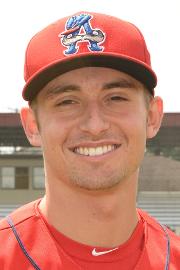

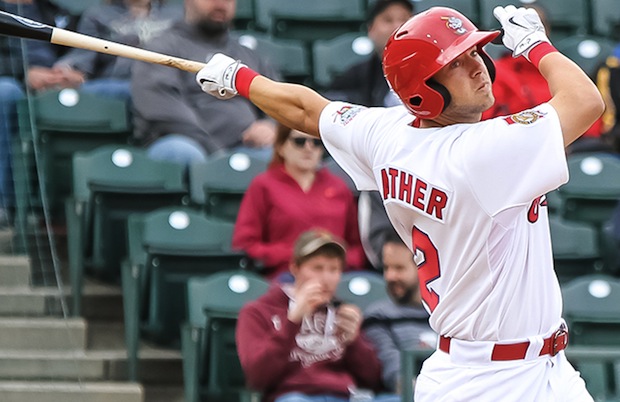
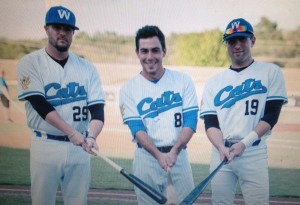

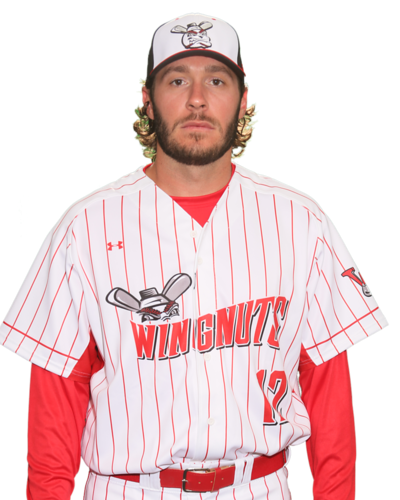


 By Scott Barancik and Zev Ben Avigdor/
By Scott Barancik and Zev Ben Avigdor/







